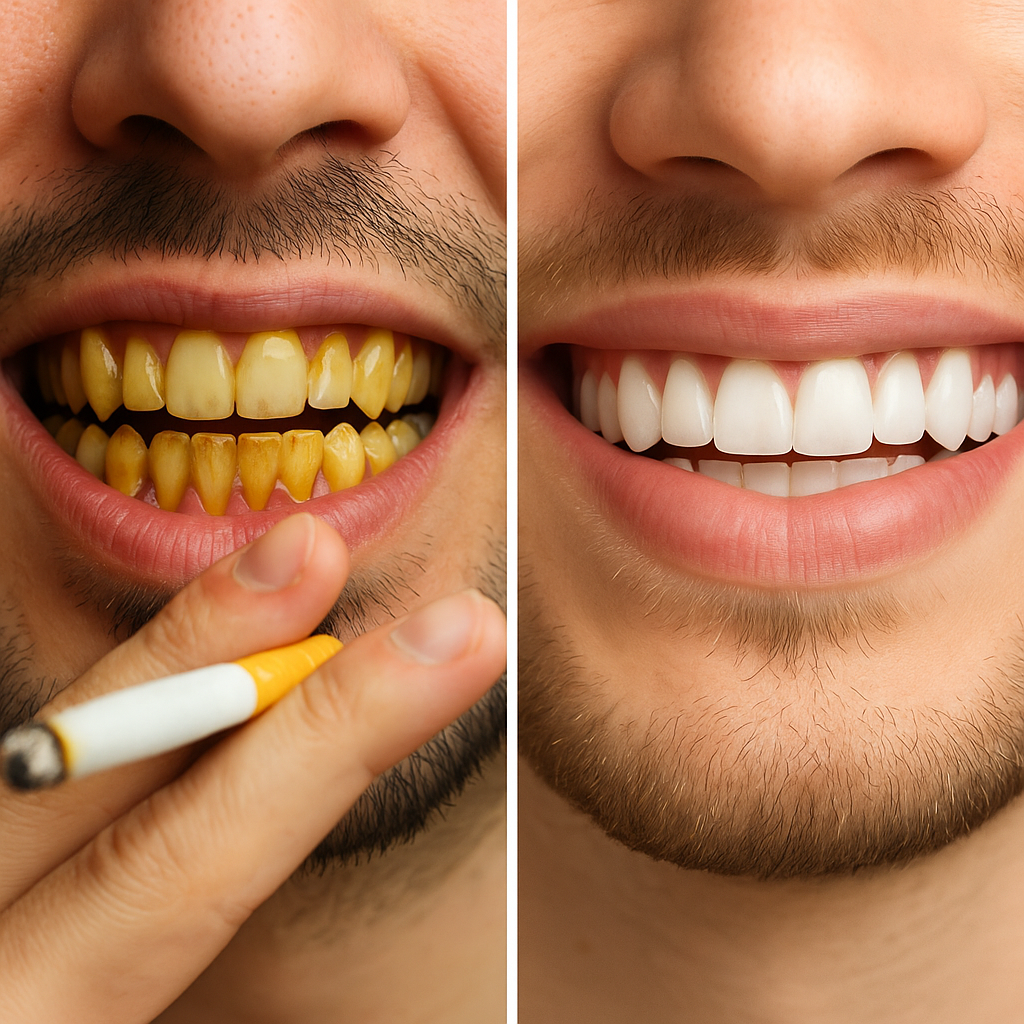Yes—smoking is extremely bad for your teeth and gums. It stains enamel, causes bad breath, increases your risk of gum disease, slows healing, and can even lead to tooth loss and oral cancer.
Most people know smoking is harmful to the lungs and heart, but its effect on oral health is often underestimated. The truth is, smoking damages nearly every part of the mouth—your teeth, gums, tongue, and even your sense of taste and smell. It’s one of the leading causes of tooth loss and a major risk factor for oral cancer.

If you’ve ever wondered, “Is smoking really that bad for my teeth?” the answer is a resounding yes. Here’s why.
Nicotine and tar in tobacco smoke quickly seep into tooth enamel, leaving yellow or brown stains that are difficult to remove—even with professional cleaning. Long-term smokers often develop deep staining that can only be addressed with advanced whitening or cosmetic dentistry.
Tobacco particles linger in the mouth and lungs, leading to persistent bad breath. Dry mouth (a side effect of smoking) worsens the issue by reducing saliva, which normally helps cleanse bacteria and food debris.
Smoking changes the balance of bacteria in the mouth, making it easier for harmful bacteria to thrive. This results in:
According to the CDC, smokers are twice as likely to develop tooth decay compared to nonsmokers
One of the most serious effects of smoking is its role in periodontal disease, a severe infection of the gums and bone that support the teeth.
Smokers often face complications with dental treatments and oral surgery:
Tobacco use—whether smoked or smokeless—is a leading cause of oral cancer.
Because smokers require more frequent and complex dental treatment, the financial burden adds up:
Unfortunately, no.
All forms of tobacco damage the mouth.
| Tobacco Type | Oral Health Impact |
|---|---|
| Cigarettes | Tooth staining, gum disease, tooth loss, oral cancer |
| Cigars & Pipes | Similar rates of gum disease & bone loss, staining |
| Smokeless Tobacco | Oral cancer, gum recession, tooth decay from sugar content |
1. Can smoking really cause tooth loss?
Yes. Smoking weakens gum tissue and bone, making gum disease more severe and often leading to tooth loss.
2. Does vaping have the same effect as smoking?
While research is still ongoing, vaping also exposes the mouth to harmful chemicals and nicotine, which can reduce blood flow, cause dry mouth, and increase gum disease risk.
3. Can a dentist tell if I smoke?
Yes. Stains, tartar buildup, receding gums, and delayed healing are all visible signs.
4. Will quitting smoking improve my oral health?
Absolutely. Quitting reduces your risk for gum disease and oral cancer, improves healing, and helps restore fresher breath and healthier gums.
5. How soon after quitting will I notice a difference?
Many people notice fresher breath and improved taste within weeks. Gum health can begin to improve within months, and your long-term risk for oral disease continues to decline over time.
Smoking doesn’t just harm your lungs—it’s devastating to your teeth and gums. From staining and cavities to gum disease, tooth loss, and oral cancer, tobacco use is one of the biggest threats to oral health. The damage is costly, painful, and often irreversible.
The good news? Quitting smoking dramatically lowers your risk of dental disease and improves your overall health. Your dentist can help with early detection of smoking-related issues, recommend treatments, and connect you with resources for quitting.
At Designing Smiles, Dr. Deborah Fung and her team are here to help protect your oral health. If you smoke—or are ready to quit—schedule an appointment today to learn how we can support your journey to a healthier smile.
Sources:
Centers for Disease Control and Prevention – Smoking & Oral Health: https://www.cdc.gov/tobacco/campaign/tips/diseases/oral-health/index.html
National Institute of Dental and Craniofacial Research – Oral Health & Tobacco
American Dental Association – Smoking and Oral Health
Oral Cancer Foundation – Tobacco and Oral Cancer
American Academy of Periodontology – Tobacco Use and Gum Disease
